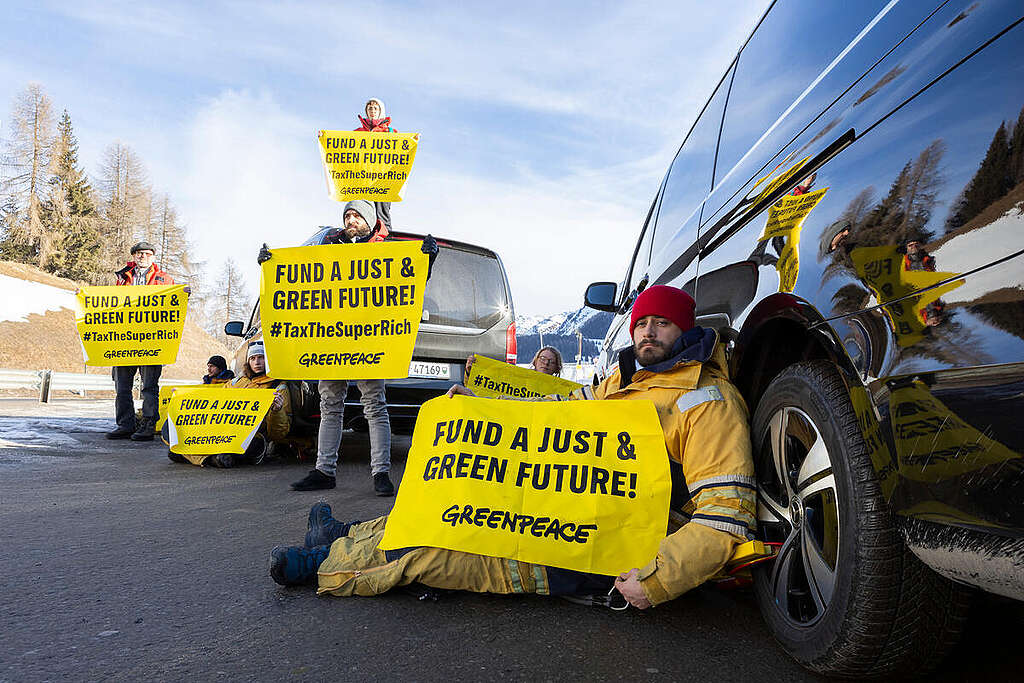You're probably paying more taxes than the richest people on Earth. Why? Because, unlike you, the super-rich can evade paying their fair share.
The tax money that billionaires are not paying could tackle the climate and environmental crises and ensure access to health and education that millions need and have the right to. This unreasonable concentration of wealth and power is putting ecosystems, democracies, economies, and millions of lives at serious risk.
"You could have paid your rent if these extremely rich people had paid their taxes" said Carl Schlyter, the co-host of Greenpeace's SystemShift, the podcast that explores how we can move from a world that serves the economy to an economy that works for people and the planet.
This week, starting SystemShift season 3 with the first episode Would the World Change If We Taxed the Super Rich?, we talked with Chenai Mukumba, Executive Director of the Tax Justice Network Africa.
"There's no money" or so they say
There is a widespread narrative that there are not enough public funds to pay for people's welfare and even less for climate and environmental action – as recently happened at the COPs, where negotiations for public funding stalled. However, several reports have shown that funds are available, they are just in the wrong place.
The Tax Justice Network estimates that USD 492 billion is lost every year to tax abuse – from multinational corporations and the super-rich. "Within the African continent, we're losing close to US$ 90 billion annually," Chenai said.
If everyone paid their fair share of taxes
Those billions raised through taxes could provide substantial funding for universal basic services like healthcare, education, housing, community-owned renewable energy projects, and affordable public transportation, as well as creating jobs and fostering ecological resilience.
If implemented under a good and transparent governance system, a wealth tax can help reduce income inequality by redistributing wealth (and power) and even repair historical injustices.
That is what Chenai describes as the 5 R's of taxation: besides revenue-raising, taxes also contribute to redistribution, repricing, representation and reparations, making wealth tax such a powerful solution. "Tax is our superpower," she stated.
She also explained how wealth taxes work and how to ensure that resources raised from wealth taxes in rich nations reach the most vulnerable countries and communities.
Could this system shift any soon? Yes!
It's time for governments to #TaxTheSuperRich – who are right now mingling with world leaders at the World Economic Forum.
Today, global tax rules are being discussed in many multilateral forums and in countries around the world. Argentina, Belgium, Colombia, France, Norway, Spain, Switzerland, and the Netherlands are some of the countries that have already adopted or proposed different types of wealth taxes. If all countries followed Spain's example, USD 2 trillion could be raised per year, globally.
The growing momentum around this issue is focused on the UN Tax Convention process and among the G20, made up of countries where more than 68% of citizens agree with taxing the rich.
"This conversation about a global tax system needs to happen at the UN, where every single country has a seat at the table," Chennai added.
What's our role as an individual? What can we do?
These are some concrete steps we can take to support the #TaxTheSuperRich demand:
1. Listen or watch the first episode of the new season of the SystemShift podcast – which inspired this blog post.
2. Sign the petition and urge governments to #TaxTheSuperRich now and to use those funds to support people and protect the planet.
3. Learn more about global tax rules. You can start by reading this: We need global tax rules that work for people like me (not multinational corporations and the ultra rich)
Join the movement! Together, let's urge governments to tax the super-rich and fund a green and fair future.







